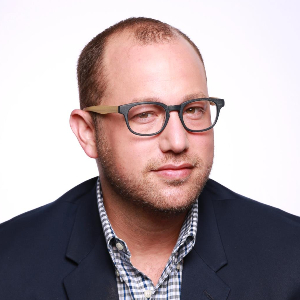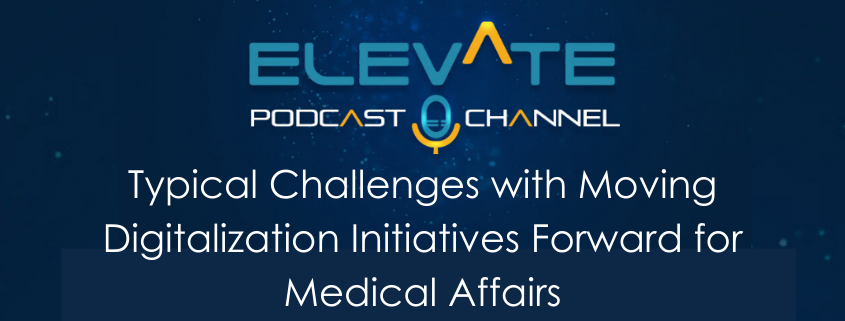The podcast objectives are to:
· To discuss some of the common challenges Medical Affairs organizations face in offering best-in-class digital capabilities to its customers.
· To offer some insights and perspectives both internally and externally to understand what opportunities exist to overcome these challenges.

MODERATOR: Rishi Ohri, MBA, MS

INTERVIEWEE: Robert Stevens
Following is an automated transcription provided by otter.ai. Please excuse inaccuracies.
Rishi Ohri
Welcome to the Medical Affairs Professional Society’s Digital Focus Area Working Group’s podcast three-part series entitled “Typical Challenges with Moving Digitalization Initiatives Forward for Medical Affairs.” My name is Rishi Ohri and I will be the moderator for this podcast. I serve as a member of the digital focus area working group, and I’ve been with Astellas Pharma for the past 13 years and have been specializing and heading digital excellence within Medical Affairs for over six years. Our legal disclaimer states the views expressed in this recording are those of the individuals and do not necessarily reflect on the opinions of MAPS, or the companies with which they are affiliated. This presentation is for informational purposes only and is not intended as a legal or regulatory advice. We encourage you to engage in the conversations about typical challenges with Moving Digitalization Initiatives Forward for Medical Affairs with other MAPS members via the community portal on the MAPS website. Simply login with the email address and password associated with your MAPS account and click on the discussion tab, then scroll down to the digital strategy section and post a question or review previous postings. The podcast objectives are to discuss some of the common challenges Medical Affairs organizations face in offering best in class digital capabilities to its customers, and also to offer some insights and perspectives both internally and externally to understand what opportunities exist to overcome these challenges. In today’s part one of three series, we will be discussing some key themes as it relates to structuring digital for success within MA, which include organizational design, talent management, and recommendations to respond to these challenges. For today’s conversation, I am joined by Robert Stevens, VP Global Head Digital Medical Affairs at Novartis. Robert has been with Novartis for 16 years. And Robert previously led digital strategy and medical innovation for Novartis US prior to taking on his global remit.
Robert Stevens
Thank you, Rishi. It’s a pleasure to be here.
Rishi Ohri
Thanks, Robert. So, Robert, you know, when we last spoke, you had mentioned a really interesting idea, which I believe you refer to as Digital 101. You know, we all have different ideas of what digital is or could be, and it could be anything from using a calculator to using some VR/AR capabilities, you know, and they always say knowledge is power. So how can we create a baseline understanding? From your perspective, Robert, how would you recommend we think about digital for Medical Affairs?
Robert Stevens
You know, it’s a really important question, and I think the key word here is baseline. The medical function in my view, it needs to really build a baseline foundation, by which it can really accelerate digital transformation. The challenge I think we face with that is that digital is not equally understood, until there’s a famous quote that talks about the future being here, but it’s not evenly distributed. And then the same only applies for digital Medical Affairs. And so, I think by us focusing on the baseline foundation, what we can do is, is reverse the tendency I see where people tend to overcomplicate what digital is, and then also under appreciate the complexities for what digital is in the medical function. And so, I think a good way to think about it is when I talk to people about digital, and I try to explain to them what exactly it aims to accomplish for the organization, I typically ask them questions about like the digital world around. So Rishi, for example, you know, asking questions about what we buy in Amazon? Or do you use Spotify? What about Instagram? Using the, you know, let’s just say, Verizon and Chatbot. Asking these types of questions will often demystify, people, it’s a really good starting point. Because again, people tend to overcomplicate what digital is. The challenge with that is people jump on the bandwagon, and they suffer from the infamous “FOMO” fear of missing out. And so, I’ve literally had conversations with people that have said stuff like, “Hey, want to build a chatbot?” And the follow up question will ask is, “Have you ever used one?” And I’m just shocked that people haven’t. Not that they haven’t, but they want to build a strategy to do a chatbot and not having the experience. And so, for me, it’s really important that we set baselines by which we measure our digital acceleration for the medical function. And I think the medical function, the other point I want to make here is, run a journey. Right? So, the commercial function has been I would say, maybe in my opinion, further along than the medical function. And so, it’s really important that we get our, our aspirations right and we have to move away from building text centered wish lists to more strategic objectives that align with medical strategy. And so, a more mature organization would have impact focus narrative for this strategy. We want to educate more ATPs on X topics. Right, so we’ll deploy Y tactics, and we’ll measure Z results. Lastly, which I’ll just say real fast to close it out is, my team and I went through an exercise very recently, and it was three things that were important one, what project are you working in? What’s the value to medical? And what will success look like? If those questions can’t be succinctly answered, it may not be worth going forward?
Rishi Ohri
That’s fantastic. Robert, thanks. Thanks for sharing your thoughts on that. And I think just in line with that, one other discussion that we’ve had is around how late Medical Affairs is to the digital transformation era. And you know, I think from your experience, and I completely agree with you with, your advice and your team and how you’ve managed the journey in in your in your company. But as far as others in this journey, and the evolution, what are some things that you might provide as far as advice to those MA teams trying to really kickstart their digitalization journey?
Robert Stevens
So, I’m going to be biased here. But I think that the medical function, at least in this stage of the medical functions’ evolution, we really benefit from having a centralized digital group that sits at the medical leadership team level. And it’s hyper focused on infusing digital across the medical function. If it doesn’t have that vantage point, driving the organizational change, which really is what digital transformation is about, may not happen. We talked earlier that, you know, digital in a commercial marketing function might be more mature than medical. And I think, you know, in the future as impactful digital jobs, if they’re done super well, whether a medical commercial, wherever it might be, digital jobs done really well mean that people have to find themselves new roles. Because, again, digital should get to a place where it’s evenly understood. But we’re not there yet. And the best way to get us there as a medical function is to empower a digital medical team to set the medical leadership level in an organization.
Rishi Ohri
That’s, phenomenal. And, Robert, you know, you mentioned something about in that last statement around impactful digital. Can you help me understand more about what you mean by that?
Robert Stevens
Sure. So, you know, I’m really big on demonstrating impactful digital, meaningful digital having baselines I’ve observed across the industry, that digital is being unleashed everywhere, especially in this COVID era. However, so many projects probably suffer from what I call the rearview neglect. Meaning, once we kick things off, no one really looks in the rearview, plus three months, six months, nine months, 12 months later, to see how the digital project delivered. And if there is a rearview check, we don’t push hard enough to see how that project translate into impact. Is it really transforming patient outcomes? That’s really what’s front and center for us, when we think about how we deliver digital transformation and medical. And so, Rishi when I say impactful digital, what I mean by that is digital project, or impact can be clearly measured and articulated.
Rishi Ohri
Very true. I think that rearview mirror piece is something that we all can learn from, to make sure that we’re delivering impact and value that Medical Affairs promises. You know, shifting gears a little bit. One of the objectives here is to talk a little bit about the talent pool and understanding more about how do we acquire the skillsets to really implement these digital initiatives within Medical Affairs. This type of talent has really talented understand the technology aspects, the Medical Affairs aspects, and the digital applications to support it. It’s often described as the golden unicorn of sorts, which is really hard to find and interested to understand your opinion, Robert, on what your experiences in overcoming this challenge.
Robert Stevens
Yes, so I mentioned earlier that I think people tend to overcomplicate digital. And so, I think it’s really critical that people working in digital and medical function really work hard at demystifying it. You know, I think, and this is just to get personal for a moment, my first digital medical role and remember being intimidated, because I don’t really have a super strong scientific background. I’m not a PharmD, MD, or maybe perhaps not a traditional medical background. But I have brought change in the organization. So I remember speaking with a former boss of mine, and just having a very candid conversation saying, “Look, I’m really flattered by this opportunity, but a bit intimidated by the fact that I’m extremely strong grasp of medical.” And the advice was really good, and I would pay that advice forward here which is basically you know, medical is really smart people, right? And you also have people that can do digital really well. But being tenacious is the key. That’s what really that to me Rishi, that’s the golden unicorn. If you want to do digital in Medical Affairs and do it successfully, yes, you can take someone in medical, super smart, that great background, right? You could teach them digital, you could take a digital person real the function and throw in medical. But tenacity that isn’t always something easy to come by. It’s not a good textbook, you’ll learn by. So me, I would look, I look for tenacity, persistence, people that can really drive the change. You know you could teach these things, but it’s that human element of persistence and grit that enable someone to succeed in that type of role.
Rishi Ohri
Wow, that’s fantastic, Robert, thanks. Thanks for that insightful feedback. And also knowing our MAPS community, in which point we are all at different points in our in our journey to implement digital in Medical Affairs. Can you provide more perspective on additional challenges to look out for from your very deep experience in this field, and maybe some key takeaways or recommendations to help respond to these challenges?
Robert Stevens
Sure, happy to do so. I don’t know Rishi. There’s like one single big watch out. I think the way I would want to kind of offer at least where I’m going to focus and what I’ve been focusing is on three things. And again, I want to frame it, let’s not overcomplicate it, but let’s also not neglect that medical function does have nuances that are really important. So, I’d recommend three things. One, you need to empower the function to drive the digital agenda. We’re talking about change management in its basic form. And it’s complicated, because digital isn’t easily understood, as I said, so one, empower the function. Two, encourage experimentation, giving a department a digital agenda to do. It’s like an experiment. And if you have to encourage risk taking, embrace failure, encourage repeat, right? You keep trying and testing and trying and testing. And so, I really, I really think encouraging experimentation for a digital medical function is critical. I failed, just as much as I succeeded. It’s really important that we embrace that. And the third, I would say is, you know, strive for impact. One of the themes that I hope everyone can take away here is, is it’s really important we think about impact in baselines, right? So, strive for impact. If you’re doing a digital campaign. How will you show value? Don’t get lost in the crazy cool flashiness of digital and really focus on how will I be taking engagement. As an example…What do I want to educate on? What’s gonna be the impact? What’s gonna be the tactic? And how do you link that? So those three things, empower the function, encourage experimentation, and strive for impact.
Rishi Ohri
Well, thanks, Rob, you know, what you’ve described is how I describe my role is really an art and a science. And so, I really appreciate that about your comments there since it’s very much aligned with my experience, as well. But we’re near the end of this. And I did want to offer a very big thank you to Robert for such insightful feedback. And just to remind everybody of the objectives for this podcast, really, we’re to discuss the common challenges that Medical Affairs organizations face and offering best in class digital capabilities to its customers and to offer some insights as well as perspectives both internally and externally to understand what opportunities do exist to overcome these challenges. We focused on organizational design and concepts as well as talent management and a future outlook. This has been the first podcast in a series on typical challenges with moving digital innovation initiatives forward for Medical Affairs. In our second podcast, we will be speaking to another internal MA industry expert, Jonathan Davies, from Astellas Pharma, on the role of Operational Excellence plays within our journey of implementing digital in Medical Affairs. I hope you will join us. And if you are a MAPS member, thank you for your support of MAPS. If you’re not yet a MAPS member and would like to access additional resources in this area, please visit the MAPS website to explore joining today at www.medicalfairs.org/membership. This concludes this podcast.






